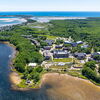Portland condo market poised for upswing
When real estate broker Gail Landry assesses the prospects for selling units in the Bay House, a 94-unit, apartment-and-condo complex under construction off Portland's India Street, she is particularly heartened by one nugget of demographic data.
"There are 10,000 baby boomers turning 65 every day for the next 20 years," says Landry, a broker with Town and Shore Associates. "They are downsizing — but not downgrading — and they have a very strong desire to live close to urban centers."
While the Bay House is still in the early stages of construction, Landry says almost 50% of the condo units in the first phase of the project are under contract, with some prospective owners in the wings to snatch up coveted units should others back out. The condos are expected to be priced from $160,000 to $750,000.
"It's a great time in terms of demographics and a city like Portland is a natural magnet for those baby boomers," says Landry.
Interactive: See a map of Portland's condo sales through 2012.
The influx of the 65-plus set is just one factor contributing to a spike in Portland condo sales, which are bouncing back after a seven-year lull. Other factors include an influx of younger, first-time home buyers and enduring low-interest rates on mortgages, as well as the increasing appeal of condos as investment properties. Combined, they are reviving a rebounding sector of the housing market that anticipates at least 100 new units to come into the market by 2014.
Rebounding sector
At the height of the housing bubble in 2005, Portland condo sales peaked at 367, according to the Maine Real Estate Information System. Sales continued to slip over the next six years, bottoming out at 189 sold in 2011. But many real estate professionals think the market is on the upswing, citing 227 sales in 2012, a 20% improvement over the previous year. The condo absorption rate has also climbed, with properties selling 26% faster in 2012 than they did in 2011.
Pricing, too, seems to have stabilized after a seven-year slide. In 2005, the median price for a condo in the city was $233,000. That figure reached its lowest point in 2009, dropping 20% over 2005 numbers before rebounding to $199,000 in 2012.
Ron Knott, vice president and director of mortgage and consumer finance with Gorham Savings Bank, credits the rebound to historically low interest rates and increasing consumer confidence in the housing market.
"These interest rates are something we haven't seen in 60-plus years; they are having a tremendous impact," Knott says. "We have hit the bottom and rates and values are going to be picking up, so the opportunity is good right now for buying, whether it's a first home or existing homeowners selling and moving on to another, smaller home."
Knott says his bank has seen an increase in purchase loans over refinancing loans in the last several months, a trend that he says is a good indicator of consumer confidence. Overall, 30-year fixed-rate mortgage rates in Maine have dropped 27% over the last decade, and are now down to 4.38% from a decade high of 8.63% in August 2007 according to mortgage and consumer loan analysis firm HSH Associates.
"Our experience is that things appear to be picking up and heading in the right direction," Knott says.
Armed with a newfound sense of freedom, liquidity and a strong desire to live in a culturally and socially relevant urban environment, baby boomers are becoming one of the biggest drivers in Portland's condo market.
"There is definitely a trend of baby boomers and empty nesters selling the big house and moving back in town. They've got liquidity from selling their homes and low interest rates are also helping. It's a different profile than when our parents were retiring," says David Marsden, associate broker with RE/MAX By The Bay.
Urban retirement is not limited to Portland, but Marsden says the city has some unique attributes that make it particularly alluring to baby boomers.
"People want that walkability to restaurants, markets and museums," he says. "There's got to be an element of culture and community. They are not moving to Route 1 in Falmouth."
"There is a big shift occurring in how people want to live," says Tom Federle, the real estate attorney who represented developer Donald Sussman in his recently stalled Newbury Lofts project in the East End. "They want to spend less money on transportation, less time in their cars and want that vibrant, urban lifestyle."
On the other side of the age spectrum, Federle says Gen X and Y-ers — born between the late '60s and late '90s — are a demographic piqued by the perks of living downtown, and want to take advantage of rock-bottom interest rates.
"I think there is really positive demand coming from across the generational divide. [Younger people] don't want to live in the suburbs, they want a community where they don't need a car," he says.
The lower price point for a condo versus a conventional home is also driving sales. The median sales price for a single-family home in Portland was $224,000 while the median condo sales price was $199,000 in 2012. Real estate broker Michael Sosnowski, who maintains the housing market website Maine Home Connection, says condos are increasingly becoming a starter home for younger individuals or couples.
"These are people who can't afford to buy a home but who want to own something. I don't think we are becoming a rental nation, so condos are still a very affordable alternative," says Sosnowski.
But he notes that while baby boomers are increasingly leaving suburbia for urban locales, young families are prone to do the opposite.
"If you're a couple that's been married for two years, have a kid and want another one, forget it, because a two-bedroom, one-bath condo isn't going to work," he says.
Investments
While demographics are pushing condo sales in one direction, there is a noticeable push coming from people who have no intention of living in them, but rather look at condos as a promising investment.
Low vacancy rates in Portland and increasingly stringent mortgage lending practices have primed the local condo market for investment opportunities as discouraged first-time homebuyers are diverted to the rental market.
"People can't get loans, either because their credit has been affected or their job has changed, … so investors are seeing [triple incentives]: they have leverage, low interest rates and rents are projected to be strong for at least the next three to five years, so they say 'Hey, I'm getting into the game'," says Marsden.
"There is liquidity in the market. Cash is sitting on the sidelines and people are realizing we hit the bottom of the housing market, so the presumption is that things have got to come back a little and if I can get in at bargain basement prices, it's a good investment," Marsden says.
Multi-family buildings often see a return on investment of between 12% and 8%, Marsden says, outpacing typical returns on condos. But condos are considered a safe investment for people looking to park money in a property with modest returns and lower risks.
While Sosnowski sees real estate as a good investment in general, he doesn't expect a wave of well-heeled investors descending on the city to battle for condos.
"As the city of Portland continues to improve with developments along the waterfront, Bayside and the [renovation] of the Civic Center — that all helps — but [investors] are going to go buy cheap property in South Beach [Miami] that's been depreciated 50% way sooner than they are going to buy in Portland," says Sosnowski. "We've still got a lot of things to do in terms of changing our image of being a frozen wasteland."
The sweet spot
While condo sales in general are on the rise, there is a segment of that market doing especially well, according to RE/MAX Heritage Associate Broker Harper Lee Collins, who presented on the condo market at the annual Maine Real Estate and Development Association's forecasting conference in January.
In her MEREDA presentation, Collins identified the 1,000-to-2,200 square foot, $250,000 or less condo as the "sweet spot" in the Portland market. In 2012, 149 of the 227 condo units sold in Portland fell into the $250,000 or less range; 38 units sold in the $251,000-to-$350,000 range; and 20 units sold from $351,000 to $545,000.
"We are not a luxury-condo market by any stretch and there is no evidence to suggest we are moving in that direction," says Sosnowski, who says that the large condo developments currently under construction in Portland are possibly out of synch with market demands.
"I think more of the market is going to be smaller developments that are more personable and customized buildings that are being renovated. I think that's still the character of our city," he says.
There are currently 88 condo units for sale in the Portland market, according to listing service IDX. Impending developments and those under construction are expected to add another 97 units to the market by the end of 2013, with the second phase of the Bay House expected to bring 52 more units.
But those larger, higher-end units might not be what people are looking for, according to Sosnowski.
"There are a lot of older people looking to sell their primary residence and buy a place in Florida or Arizona, but still be connected to Maine in the summer," he says. "They are not looking to spend $400,000. They want something small, lean and efficient."
Federle says there could be a strong demand for micro-housing units — small, lower-priced, efficiently designed units — that are growing in popularity in places like New York City. He points to Avesta Housing's 400-square-foot Oak Street Lofts efficiency apartments as an example.
"That project has been pretty well received, and I think those could be done at market rate pricing, too," Federle says.
Sosnowski expects Portland condo prices to remain stable because of a high level of inventory. Although the length of time a condo stayed on the market in 2012 was 34% shorter than 2011, the average listing time was 51 days.
"There is not a long queue of people lining up, and there is still a lot of competition for every sale," says Sosnowski. "If your property is not in excellent condition with some features that add value, it could sit on the market for a long time."












Comments